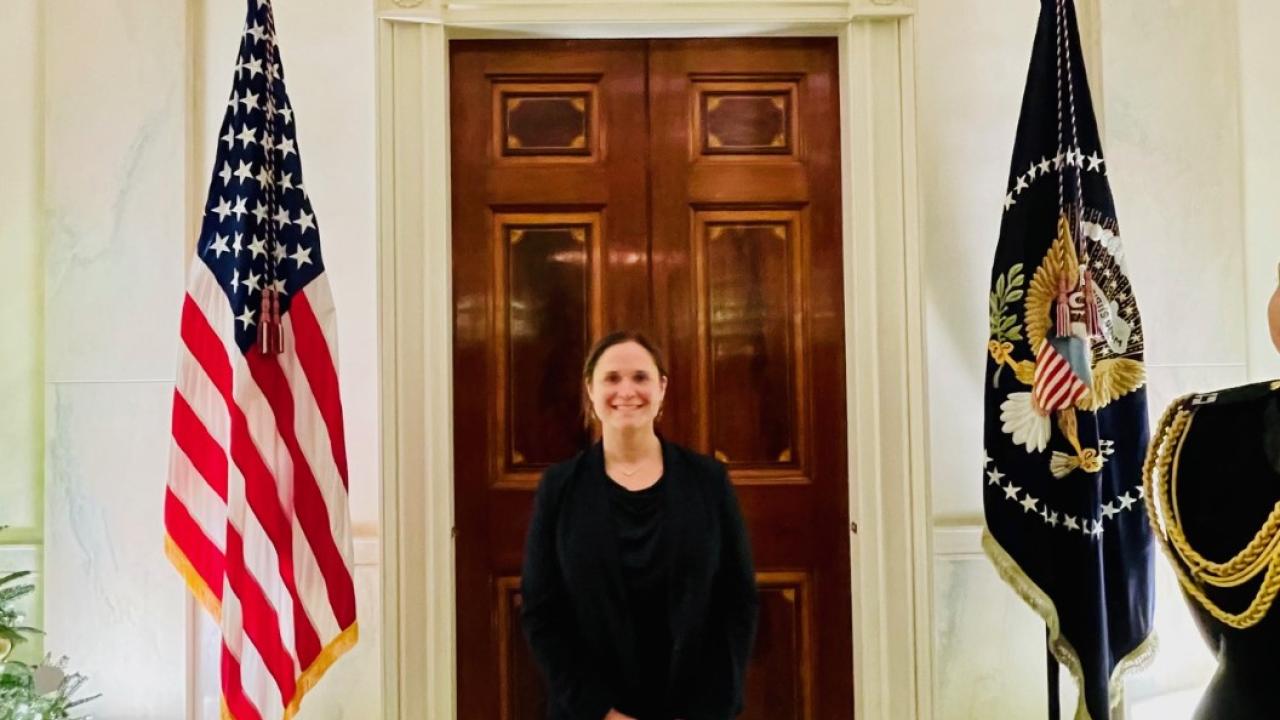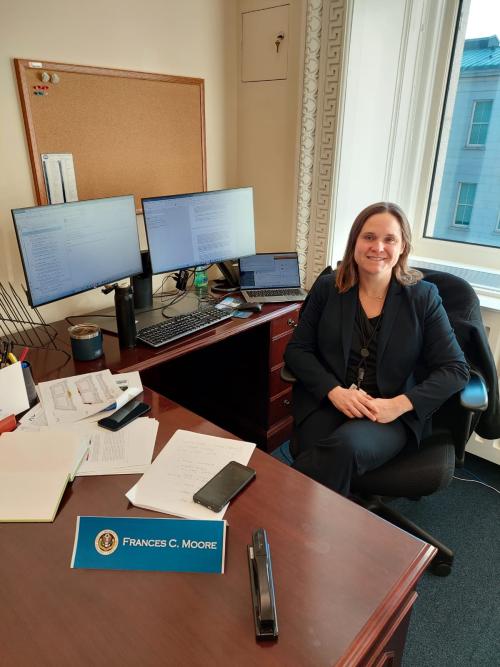
Professor Reflects on Role at the Council of Economic Advisers in D.C.
After memorable encounters with the president and collaborating with some of the world’s top economic experts, Frances C. Moore, an associate professor with the Department of Environmental Science and Policy (ESP), is shedding light on the relationship between research and real-world decision-making.
Moore spent the past year in Washington, D.C., serving as a senior economist with the Council of Economic Advisers, or CEA. The council is part of the Executive Office of the President that provides objective economic analysis and makes policy recommendations for economic growth and stability. Each year, the CEA releases the Economic Report of the President (ERP). When Moore began her term in September 2022, a big portion of her work focused on helping to write the chapter in the 2023 ERP dedicated to better managing weather risk in the changing climate.
“This was a real opportunity to dive into questions about, ‘how will climate change affect the U.S.?’ and ‘how will it affect the well-being and economic prosperity of people and communities in the U.S.?’ and ‘what might good federal adaptation policy look like?’” Moore said.
The council is composed of a chair and two members who are appointed by the president. They recruit a team of senior and staff economists, and research assistants across a wide range of economic fields. Collaborating with experts from across the country on policy-relevant issues was a highlight of her experience.
“Working with a team of people who are experts in the many different aspects of economics, like labor, health, education, international issues and trade, was a really great opportunity,” she said. “That was such a privilege and one of my favorite things about the year.”

Valuable insight
Much of her focus was on energy and environmental issues, particularly climate change policy, including both reducing greenhouse gas emissions as well as adaptation and risk management. At CEA, she worked on ways to implement the Inflation Reduction Act of 2022, a federal investment to build out clean energy and lower greenhouse gas emissions.
Moore’s research combines climate science and economics to better understand the effects of climate change and society’s ability to adapt to those impacts. A major aspect of her work focuses on quantifying the social and economic costs of greenhouse gas emissions — often referred to as the social cost of carbon — to improve estimates of the benefits of emissions reductions.
At CEA, Moore said she worked to implement part of an Executive Order on Climate-Related Financial Risks by helping develop methods to integrate climate change risks into forecasts of economic growth. This forecast of key macroeconomic variables, including gross domestic product (GDP) growth, inflation and interest rates, serves as an input to the administration’s budget proposals.
“That’s something that the CEA does, it looks out 10 years, 25 years, and projects what GDP growth is going to be, because that’s a really important input for budgeting,” Moore explained. “It was fascinating learning about macroeconomics and how forecasting works.”
Now she’s sharing some of her experiences from D.C. in the classroom at UC Davis. She was a guest lecturer during a climate policy course taught by ESP Professor Michael Springborn, where she talked about her work and the lessons she learned about policymaking. She’s teaching two classes this quarter, an introductory environmental data science class and master’s level environmental policy class, and plans to incorporate some of the ideas, research and policy goals that emerged from her time with the CEA.

Fun in the West Wing
While much of her time was spent on conducting important analytical work, she did have some fun, too. Moore said one of the perks of being a staff member in the Executive Office of the President is that you’re allowed to invite guests to tour the West Wing on evenings and weekends, so she gave some family and friends an inside look at the Oval Office and the often-seen-on-television press briefing room. She also went bowling in the presidential bowling alley in the basement of the Eisenhower Executive Office Building.
Working in the nation’s capital allowed for two encounters with President Joe Biden, including a chance to pose for a photo with him after the CEA marked the release of its annual economic report.
Overall, Moore said she enjoyed living in Washington, D.C., and the experience of working with experts from all over the country on important issues to help shape the future of our country.
“It was an amazing opportunity and such an exciting time for climate policy at the federal level; it’s definitely something that is going to stay with me,” she said.
Media Resources
- Frances C. Moore, Department of Environmental Science and Policy, fmoore@ucdavis.edu
- Tiffany Dobbyn, College of Agricultural and Environmental Sciences, tadobbyn@ucdavis.edu